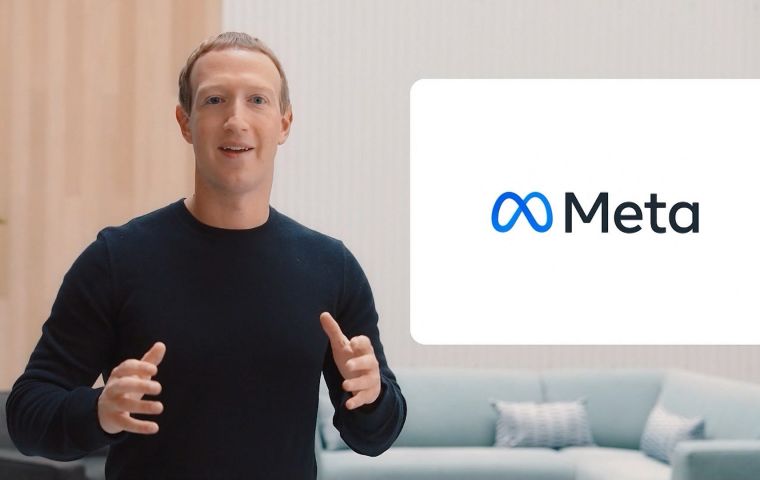MercoPress. South Atlantic News Agency
Zuckerberg's rebranding strategy sparks controversy
 The reasons behind Zuckerberg's announcement looked obviously fathomable
The reasons behind Zuckerberg's announcement looked obviously fathomable As Facebook CEO Mark Zuckerberg announced this week the company would be changing its name to Meta, public perception was quick to establish the decision was a response to a matter of public acceptance hitting record lows and many regarded the move as purely “cosmetic.”
Facebook’s rebranding effort is not unprecedented. In 2015, Google restructured into a new umbrella firm called Alphabet. But Facebook’s announcement comes amid deep regulatory and PR challenges after the so-called “Facebook papers,” a series of documents leaked by a whistleblower exposing toxic business practices and internal knowledge of its long-term negative public health impact. The company has in recent years been served with a lawsuit from the Federal Trade Commission (FTC) and in 2019 it was fined US $ 5 bn for “deceiving” users.
Zuckerberg announced the new name at Facebook’s annual AR/VR conference Thursday, where he outlined the company’s vision for the future. The rebranding effort will encompass Facebook, Instagram, WhatsApp, and the virtual reality brand Oculus, all of them under a blue infinity symbol as a logo.
“We believe the metaverse will be the successor of the mobile internet,” Zuckerberg said. “We’ll be able to feel present – like we’re right there with people no matter how far apart we are.” Zuckerberg also said he expected the metaverse to reach a billion people within the next decade. Facebook’s metaverse gaming platform would allow users to customize their avatars and digital spaces, decorating a digital office with pictures, videos and even books. The presentation imagined users inviting friends over virtually, two people attending a concert together despite being across the world from one another, and colleagues making work presentations remotely. “The best way to understand the metaverse is to experience it yourself,” Zuckerberg added, though “it doesn’t fully exist yet.”
Although the CEO insisted that it was a long-term product, a BBC reporter has raised doubts about the motives behind the change, because “having a name completely unrelated to your main product is a strange thing.”
Facebook rolled out two of its metaverse projects in beta last year: Horizon World, which allows users to invite friends over into their digital world, and Horizon Workrooms, which does the same in professional settings.
But despite Zuckerberg's sugarcoating, critics claimed the metaverse project was a distraction from the company’s PR crisis. “The fact that Zuckerberg has set his sights firmly on the so-called ‘metaverse’ while societies all over the world are scrambling to alleviate the myriad harms caused by his platforms just goes to show how out of touch Facebook is with real people,” said Imran Ahmed, CEO of the Center for Countering Digital Hate.
In her recent testimony, whistleblower Frances Haugen said she was “shocked” to hear how much the company was investing in the metaverse while its safety efforts failed. The company has dedicated $10bn in 2021 to the metaverse while its safety division received $5bn in funding. “To echo Frances Haugen’s words, just imagine what Facebook could achieve if it devoted even a fraction of its metaverse investment on proper content moderation to enforce even the most basic standards of truth, decency and progress,” Ahmed said.
Others warned Facebook’s metaverse launch could mean a new space in which the company has a monopoly, amid ongoing antitrust concerns. Nick Clegg, Facebook's vice-president of global affairs, acknowledged that the company has faced criticism for not envisioning the long-term impacts of its problems. “We have years until the metaverse as we envision it is fully realized. This is the beginning of the journey,” Clegg said.
US Rep. Alexandria Ocasio-Cortez posted on Twitter that Zuckerberg's choice of brand was in line with “a cancer for democracy metastasizing into a global surveillance and propaganda machine to drive authoritarian regimes and destroy civil society ... for profit!”
In July, Zuckerberg had announced Facebook would “effectively transition from people seeing us as primarily being a social media company to being a metaverse company” and he wrote Thursday that the company’s corporate structure would not be changing, but how it reports financial results will.
Facebook has been under intense scrutiny over the past several weeks, with Instagram particularly drawing most of the criticism for becoming a toxic place for teenagers, especially girls. Antitrust regulators are also pushing for the company to be broken up, as public trust in the social media platform is flagging.
Multiple news outlets have reported earlier this week on the deep concern among Facebook’s researchers that its user base was ageing, and the platform was losing traction among younger generations in addition to Facebook's tiered system which prioritizes which countries would receive enhanced protections around elections.
Meta is to phase out the Oculus branding, it was announced, but the Oculus Quest product line will survive as the Meta Questline, and the Oculus App will be called the Meta Quest App in early 2022.
For the time being, most of the group's income continues to come from advertising on Facebook and Instagram. In recent earnings reports, the company announced its virtual reality segment had grown so substantially it would now report its revenue separately, dividing its products into two categories.




Top Comments
Disclaimer & comment rulesCommenting for this story is now closed.
If you have a Facebook account, become a fan and comment on our Facebook Page!